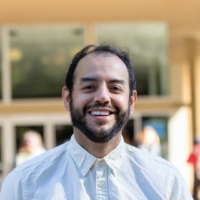by Peaches Chung
Homeownership is often framed as the American dream. For José Loya, it is also one of the clearest windows into how inequality is reproduced in American society. As an assistant professor of urban planning at UCLA Luskin, Loya examines how race, ethnicity, and structural inequities shape who has access to opportunity — and who doesn’t.
Loya’s interest in housing was sparked as an undergraduate at Brown University during the Great Recession, when countless families faced foreclosure.
“I was trying to understand why people were going into foreclosure and potentially losing everything,” he recalls. Working with a faculty mentor who specialized in homelessness and housing instability, he encountered the question that has guided his research ever since: How do we explain, and ultimately address, racial and economic inequality in the housing market?
Loya describes himself as a social stratification scholar. The patterns he uncovers aren’t new, discrimination in mortgage lending has been proven for decades, but his methods are.

Professor José Loya
“I’m using modern statistical tools and richer, more comprehensive datasets than previous generations of researchers had,” he explains. “The findings may not be surprising — that whites and Asians tend to be the most advantaged in the mortgage market — but the nuance is different. I can show how inequality persists today, not necessarily in the same form as 50 or 70 years ago, but still present.”
Much of his recent work examines barriers that prospective homebuyers face in the post–Great Recession era, as well as the ways Latino subgroups experience the mortgage market differently. Traditional research often treats Latinos as a homogenous category, something Loya argues conceals important differences.
“Latinos are an ethnic group, not a racial group. There is tremendous diversity,” he says. “By drilling down into subgroups, we start to see how different racialized experiences among Latinos shape their access to homeownership.”
A Wealth-Building Tool That’s Slipping Out of Reach for Many
Homeownership remains the single largest vehicle for building wealth in the United States. But Loya’s research shows that the tool is becoming increasingly out of reach for the very communities who could benefit from it most.
“In the last decade and a half, home prices have grown much faster than wages or any measure of labor success,” he says. “Middle-class and lower-income families are being squeezed out.”
Add in rising interest rates, limited housing inventory, and skyrocketing demand, and a central question emerges: If homeownership is no longer accessible, how do families achieve upward mobility?
Loya points to a paradox at the heart of U.S. housing policy. “Our banks want you to be a homeowner. The tax system incentivizes it through the mortgage interest deduction, one of the largest subsidies in the U.S. tax code. But the financial risk is growing and making it less achievable for lower and moderate-income households. Today, those subsidies are being largely utilized by higher socioeconomic households.”
According to recent data, the homeownership rate for non-Hispanic white households sits around 73–74%, while Black households own homes at roughly 45–46%, and Hispanic/Latino households at about 50–51%. “Progress has been made,” Loya says. “But the gap is nowhere near closed.”
Why Research Matters Now More Than Ever
For Loya, UCLA Luskin offers the ideal environment to confront these challenges because the school engages students in opportunities for intersectional learning, bringing together perspectives from multiple specialties to tackle social, economic, and environmental challenges.
“Society doesn’t operate in silos,” he says. “If we’re talking about access to homeownership, we’re also talking about labor market insecurity, education access, local zoning, transportation, climate change — all of it.”
“Good research doesn’t always give you an answer. It shows you how much more work is needed to get to an answer.”
At a time when federal research funding faces threats and universities nationwide are navigating political pressures, Loya is direct about why research still matters.
“Universities don’t just study the problems of today,” he says. “We’re trying to anticipate the problems 20 or 30 years from now.”
His own work, he says, is less about providing immediate fixes and more about documenting how historical patterns of inequality still shape outcomes today — and will continue to shape them in the future if left unaddressed.
Preparing Students for Real-World Challenges
When asked what he hopes his students take away from his classes, his answer is clear but hard to explain.
“Problems are complicated,” he says. “Good research doesn’t always give you an answer. It shows you how much more work is needed to get to an answer.”
Rather than rushing toward solutions, Loya encourages students to sit with uncertainty and ask better questions about the systems shaping outcomes. “In my classes, it’s not necessarily about finding the solution,” he adds. “It’s really about understanding the problem.”
For Loya, that’s often where the work begins — with examining the forces that are often hidden in plain sight — and equipping students with the tools to question them.

